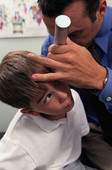- Could Artificial Sweeteners Be Aging the Brain Faster?
- Techniques for Soothing Your Nervous System
- Does the Water in Your House Smell Funny? Here’s Why
- Can a Daily Dose of Apple Cider Vinegar Actually Aid Weight Loss?
- 6 Health Beverages That Can Actually Spike Your Blood Sugar
- Treatment Options for Social Anxiety Disorder
- Understanding the Connection Between Anxiety and Depression
- How Daily Prunes Can Influence Cholesterol and Inflammation
- When to Take B12 for Better Absorption and Energy
- Epsom Salts: Health Benefits and Uses
Unapproved Ear Drops Targeted by FDA


WEDNESDAY, July 1, 2015The prescription drops your child is using for ear pain could be among 16 unapproved medications targeted this week by the U.S. Food and Drug Administration.
These drugs, prescribed and sold for years to relieve ear pain and swelling, have not been evaluated for safety, quality and effectiveness, the agency said Wednesday. The agency notified the drugs’ makers to stop marketing the drops following a few reports of local allergic reactions of the ear, eye, face, neck and mouth. The drops can also cause itching, stinging, burning and irritation of the ear, according to an FDA news release.
“If we don’t know whether these drugs have any benefits, we should not accept any possible risk of side effects,” said the FDA’s Dr. Charles Lee in the news release.
The FDA did not release the names of the companies or the medications involved, but did note that “unapproved prescription otic [ear] drug products containing the following ingredients are covered by this action: benzocaine; benzocaine and antipyrine; benzocaine, antipyrine, and zinc acetate; benzocaine, chloroxylenol, and hydrocortisone; chloroxylenol and pramoxine; and chloroxylenol, pramoxine, and hydrocortisone.
The drugs’ packaging does not disclose that the drops are not FDA-approved, Lee noted.
He said what’s most worrisome is that some of these products are prescribed for young children and infants — those most likely to develop ear infections.
“It’s very basic — drugs that are used in children should be tested in children,” Lee said. “These products haven’t been shown to be effective in anyone, and there’s no proof that they work.”
The drugs in question represent a fraction of medications prescribed to relieve symptoms of middle ear infections, outer ear infections and excess earwax. There are many FDA-approved drugs to treat these conditions, and over-the-counter products exist that can prevent swimmer’s ear and earwax buildup, the agency said.
What can you do if you think your doctor has prescribed unapproved ear drugs? Ask him or her for alternatives, the agency suggested.
Also, if you or a family member is experiencing side effects from one of these medications contact your doctor immediately.
The FDA’s action is part of its Unapproved Drugs Initiative, developed to protect individuals from medications that could be unsafe, ineffective and of poor quality.
More information
The U.S. National Institute on Deafness and Other Communication Disorders has more about ear infections.
Source: HealthDay
Copyright © 2026 HealthDay. All rights reserved.










